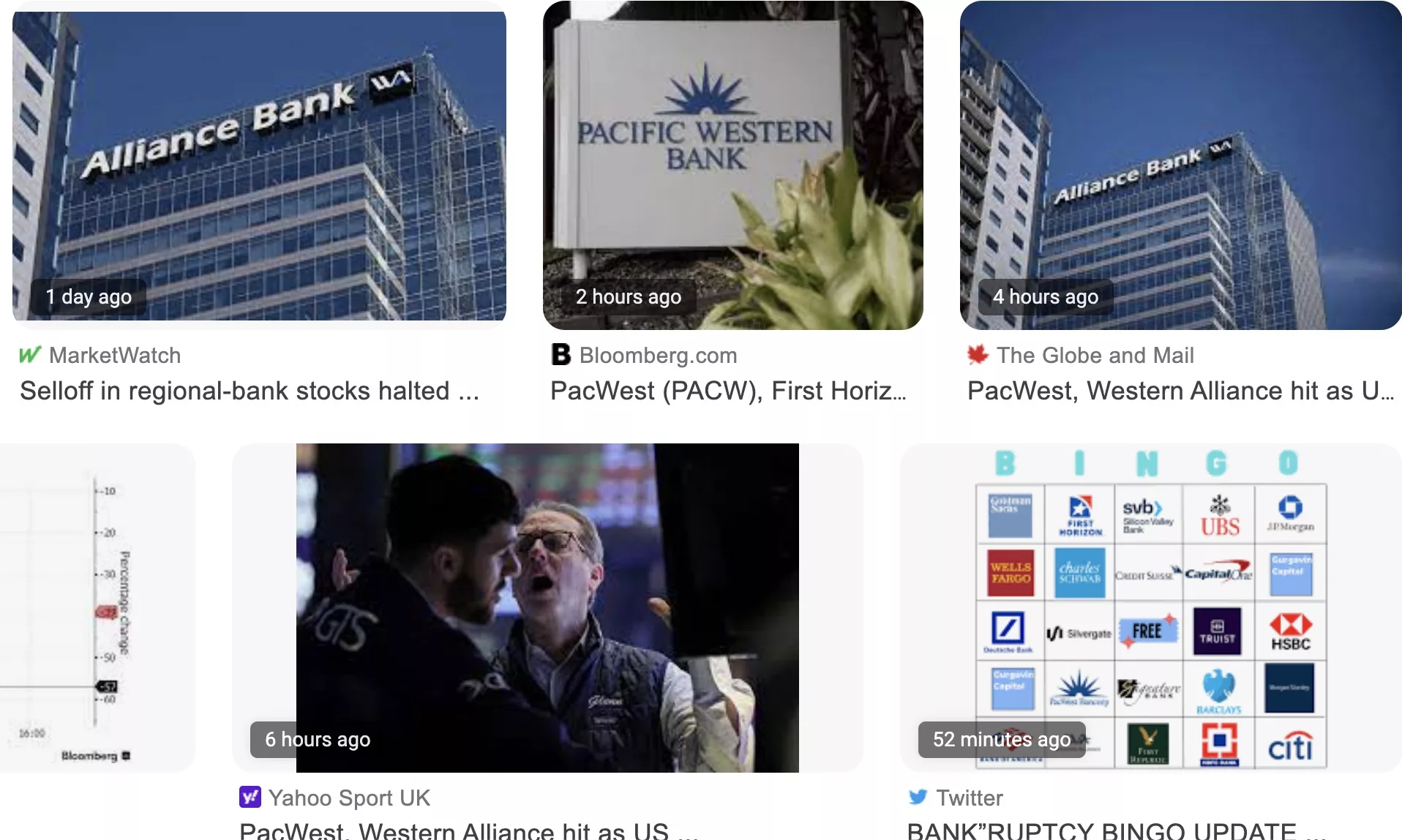
PacWest has seen a fire-sale this Thursday as investors flee regional banks with its stock dropping 50% just today.
PacWest said it was exploring a potential sale and it was looking at “all options to maximize shareholder value.”
Hours after the Western Alliance Bancorporation issued a statement to reassure investors, stating the Bank has not experienced unusual deposit flows following the sale of First Republic Bank, its stock nonetheless crashed, down 38.94% as of writing.
They have about $70 billion in deposits, and they too are exploring a potential sale amid what is now starting to look like an outright panic.
First Horizon Corporation, with about $90 billion in total assets, dived 37%. Reuters reports Canada’s Toronto-Dominion Bank Group (TD.TO) on Thursday called off its $13.4 billion takeover of First Horizon Corp.
Zion, which also has about $80 billion in assets, is down a bit less by about 10% as of writing, and 16% at one point, making this systemic in as far as all banks of a certain size are seeing investors flee.
But bigger banks are not immune. The US Bancorp (USB) is down about 7% today. Their total assets are close to $700 billion.
This sell off follows a fairly atrocious handling of the First Republic failure by regulators which gave JP Morgan a sweet deal and shoved investors.
Investors in banks that have $200 billion or less in deposits, and perhaps more because no one knows where the line is now where investors are protected below JP Morgan, are at risk of having all their investment go to zero with the Federal Deposit Insurance Corporation (FDIC) having no fiduciary duty to these investors at all.
Stock holdings of these banks therefore have become toxic, and their financial state is far less relevant than the fact investors can be whipped out without representation in any negotiations, and without any say.
That makes this one of the most challenging time in banking, and unless regulators clarify just what are the shareholders protections, if indeed any as the market currently assumes based on the handling of four bank failures so far, then this is probably going to get a lot worse.
- SEO Powered Content & PR Distribution. Get Amplified Today.
- PlatoAiStream. Web3 Data Intelligence. Knowledge Amplified. Access Here.
- Minting the Future w Adryenn Ashley. Access Here.
- Buy and Sell Shares in PRE-IPO Companies with PREIPO®. Access Here.
- Source: https://www.trustnodes.com/2023/05/04/pacwest-first-horizon-western-alliance-crash-40-on-market-open
- :has
- :is
- :not
- :where
- a
- About
- After
- All
- Alliance
- also
- Amid
- an
- and
- any
- ARE
- AS
- Assets
- At
- Bancorp
- Bank
- bank failures
- Banking
- Banks
- based
- BE
- because
- become
- below
- bigger
- Billion
- Bit
- by
- called
- CAN
- certain
- challenging
- Close
- Corp
- CORPORATION
- Crash
- Crashed
- Currently
- deal
- deposit
- DEPOSIT INSURANCE
- deposits
- down
- Dropping
- experienced
- Exploring
- Failure
- fairly
- far
- fdic
- Federal
- Federal Deposit Insurance Corporation
- financial
- First
- Flows
- following
- follows
- four
- get
- Go
- going
- Group
- Handling
- Have
- having
- Holdings
- horizon
- HTTPS
- if
- in
- insurance
- investment
- Investors
- Issued
- IT
- ITS
- jp morgan
- just
- less
- like
- Line
- Look
- look like
- looking
- Lot
- MAKES
- Making
- Market
- Maximize
- more
- Morgan
- most
- negotiations
- no
- now
- of
- off
- on
- ONE
- open
- Options
- or
- out
- Panic
- perhaps
- plato
- Plato Data Intelligence
- PlatoData
- Point
- potential
- probably
- protected
- reassure
- regional
- Regulators
- relevant
- Reports
- representation
- Republic
- Reuters
- Risk
- Said
- sale
- say
- seeing
- seen
- sell
- shareholder
- Shareholders
- Size
- So
- so Far
- Starting
- State
- Statement
- stock
- sweet
- systemic
- takeover
- TD
- than
- that
- The
- The LINE
- their
- then
- therefore
- These
- they
- this
- thursday
- time
- to
- today
- too
- Total
- Trustnodes
- us
- usb
- value
- was
- webp
- Western
- What
- What is
- which
- with
- without
- worse
- writing
- zephyrnet
- zero













